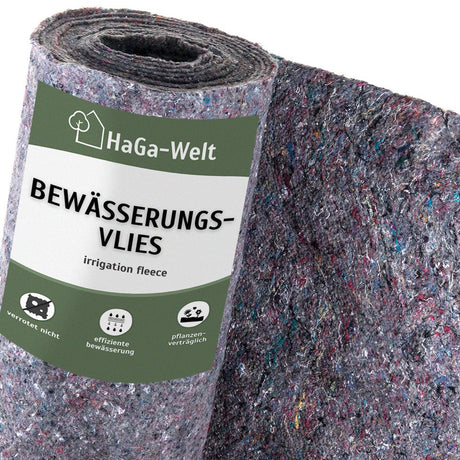Irrigation fleece 500g/m² - Water storage for long-term irrigation
From 3,89 €Content: 1 sqm (3,89 € / sqm)Unit price /Unavailable
Irrigation fleece in the garden
In the home garden or greenhouse, the fleeces ensure quick and easy prevention of waterlogging or drying out . The material balances temperature fluctuations and can also be used as shade to prevent unwanted sunlight. The fleeces from the Haga-Welt range are ideal for partition protection, erosion control, filtering, reinforcement, and drainage in the garden and around the house. They also suppress weed growth and are indispensable for the safe drainage of loosely filled and paved paths, in pond construction, or when constructing a green roof.
So simple to use
The irrigation fleece can be easily integrated into your garden's irrigation system . It can be used both in large-scale beds and in small pots. It reliably supports problematic soil that lacks water retention by holding several times its weight in water and distributing it evenly across its surface. Plants draw on it as needed. In pots, it prevents waterlogging and thus protects the roots.
Beds with irrigation fleece
For large-scale use in beds of several square meters, it's best to choose the width of the irrigation fleece that matches the dimensions of your bed. If the area is too wide for a single fleece, simply lay the fleece strips next to each other. Trim the end pieces to fit the length of the bed.
Now remove the soil. Important: The irrigation fleece should be deep enough to allow the plants sufficient space for their roots. This varies from plant to plant. If you're unsure, find out more about the plants you want to grow beforehand. To be on the safe side, you can cut a few holes in the fleece so the roots can spread freely. However, the fleece should be deep enough to prevent excess moisture from reaching the roots, which could lead to rot.
Once the soil has been removed to the appropriate depth, roll out the irrigation fleece inside. Before refilling the hole with soil, it's best to secure the fleece. This can be achieved with ground anchors or heavy stones, for example.

